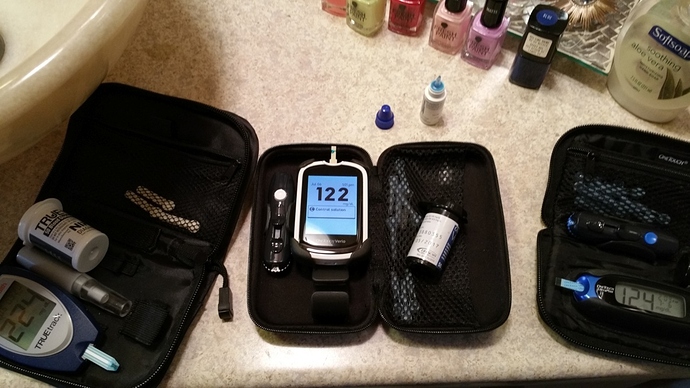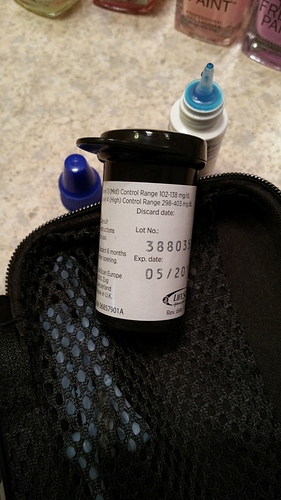Despise it. I pay cash out of pocket to avoid one touch, which is what my insurance covers
This is the one touch ultra mini. I don’t like the one touch verio.
The ultra mini was then only one touch product I ever used-- it was enough to convince me not to even bother with any others from them. Like I say I go to significant expense to avoid using anything they make including the ultra strips and meters…
Massive blood drops required, inaccurate and inconsistent. I liked nothing about it, except the carrying case-- they did get that right, it had a nice case that I could carry everything I needed in.
Not directly relevant to the topic, but one of the things I like about my Abbott meter is the unbelievably tiny drop it requires.
Agreed… I have a hard time squeezing out much blood from my fingers and small drops make it immensely easier… I’ve seen some other people bleed like stuck pigs compared to me. My truetest strips require .5 Microliter-- not quite the smallest sample on the market but up there with the best, and half what the ultra mini did-- which also results in me wasting far fewer strips
I use a One Touch Verio Sync, but only because I have to in order to calibrate my Dex.
The most accurate “meter” for me is my Dexcom CGM. I rely on it 100% of the time for dosing. As a matter of fact if I didn’t have to calibrate I would never stick my finger again.
I know this is a separate issue, but meter fluctuations and inaccuracies are truly one of the worst parts of diabetes care. Even though most have no choice but to rely on them, I don’t trust them at all.
True2go meter and I buy the truetest strips for it on amazon at $45 /300. It’s the smallest meter in the world (actually snaps onto the lid of the strip vial). I carry it around in my pocket, no case-- and it does absolutely nothing except produce a number… Try it, based on what you just described I think you might like it.
I use the Roche Accu-Chek Aviva Connect. It can talk via BlueTooth to an app on my phone that uses a artificial pancreas study database to warn of an increased risk of severe hypoglycemia in the next 24 hours. With the big-data from the trial, the researchers were able to identify patterns of variability and lows that form a signature warning. The system does not know if you’ll have a bad low but It can raise the warning when your risk is elevated.
The variability of meters is a pain, no two ways about it. But we progress. Today’s meters are a giant step forward from peeing on a strip and trying to match the color against a chart. Which doesn’t even consider immediacy vs. time lag.
Things keep inching forward. Tomorrow’s measurement technologies will be better than the ones we have now. And so on.
So which meter is considered the most accurate?
I like the Accu-chek Aviva. I always check it against the bg when I get a blood draw, and it’s never off in any significant way. plus it talks to my pump via bluetooth.
I don’t know if this means anything, but I used the control solution that came with the one touch verio. I followed a post I saw on how to check meter accuracy with the control solution. I don’t think the cvs version liked the control solution. The other two were very close and right around the middle. Don’t know if this makes them accurate or just a bs test.
The control solution is 100% bs in my estimation and only shows that the meter and strips are functional or not. Think about it, has anyone ever heard of any meter failing a control solution test? The meter itself is just a little tiny voltmeter and when blood or solution interacts with the strip it creates a tiny electrical current that the meter measures…
As the control solution is a manufactured product, it’s very easy to engineer it to create a fairly precise chemical reaction with the strip… It’s a whole lot more complicated for human blood which varies tremendously from one individual to another and even within the same individual at different times…
Well, uh, yeah . . . I believe that’s the idea. The control solution and the strip are known quantities. If they react correctly, then there is a reference yardstick against which to measure those constantly varying blood values, which is the whole point . . .
And yet they still allow themself the +/- 15-20% leeway for control solution, the precisely known quantity. I’d rather just set a strip on fire if I wanted to waste one, it’s more entertaining…
I use it along with dexcom. When I do calibrations I usually get numbers within a few points of each other. I haven’t tested it with lab results though so I’m not sure how accurate it is.
How are you guys checking your meters against lab. When you get blood drawn you finger stick at the same time?
Yes, precisely. And make a note of the reading you get, so that when you obtain the lab results you can compare the two.
Even better if the phlebotomist will let you have a drop of blood from the draw. Some will, some won’t. It averages out.
My meter has a 10% accuracy rate, requires no coding, is small and easy to drag around everydangwhere, oh and it talks to my pump…AND is only one or two numbers different than lab draws every single time. I recommend the Contour, and the Contour USB, if you have a choice and your insurance covers.
It really depends. I get equal accuracy with the Freestyle Lite, which is also quite small. And since I don’t have a pump, that’s not an issue. You pays yer money and you takes yer choice.


